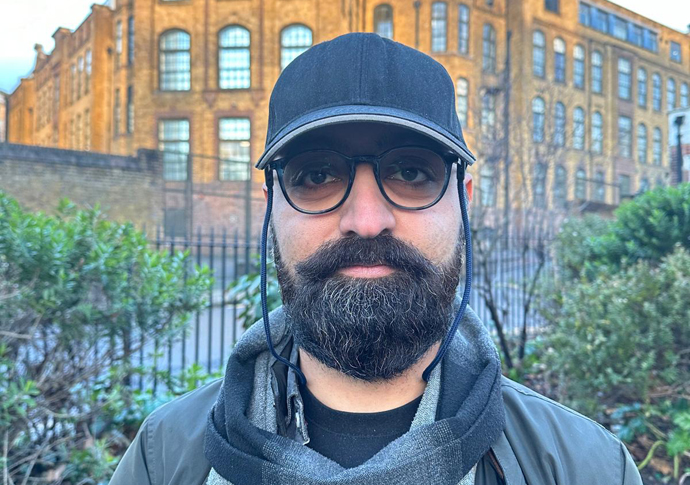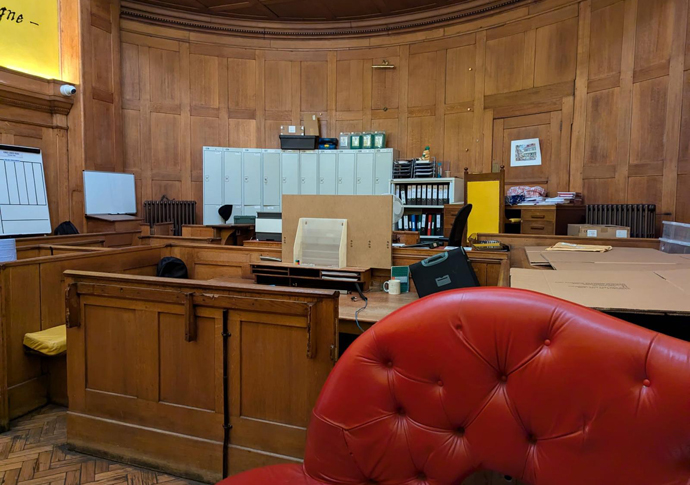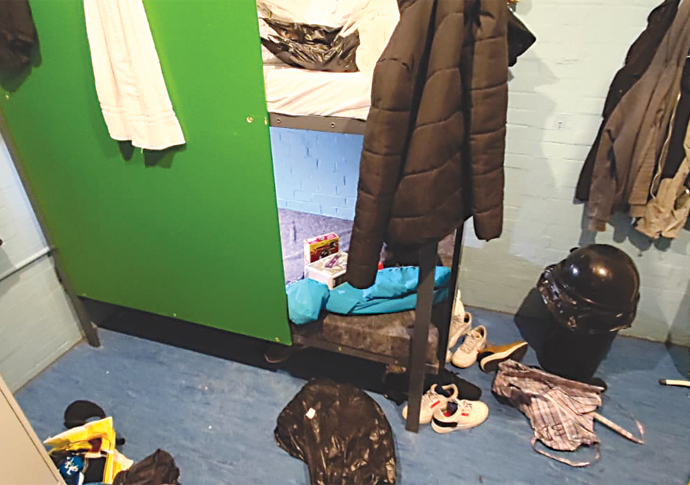How hundreds were left waiting and suffering in London’s hostel from hell
Privately-run ‘prison like’ accommodation where desperate asylum seekers can spend months is to be shut down. Investigation by Isabel Loubser
Friday, 31st January — By Isabel Loubser

Mori fled persecution in Iran and has been stuck in the overcrowded hostel where eight men share rooms in bunk beds
ASYLUM seekers who have been staying in a hostel that was once a courthouse – some for almost three years – have spoken out about the “vile” conditions they are subjected to, leading to soaring rates of depression with some even trying to hurt themselves.
More than 200 men are living in a former law building turned into a backpacker-style hostel in a location in Islington we are not disclosing.
The block once advertised the chance to “stay in a real prison cell” to young tourists, but now it is home to those waiting for their asylum claims to be processed.
At least 80 have been staying there for more than a year, with several placed there for almost three.
An investigation into the conditions has been undertaken by the council’s environmental health team.
It is understood it has also been inspected by the Home Office, although the government said it would not provide a comment on the closure in line with a policy relating to the sites used for asylum seekers.
The Tribune understands that the most recent inspections followed many months of campaigning by councillors and officers at Islington Council who have consistently raised concerns about the unsuitability of the hostel to government.

The communal area
Puncturing the myth that refugees are living great lives in nice hotels, there are descriptions of cramped conditions which see up to eight men sharing a room, sleeping in bunk beds with almost no gap between them. Some of the rooms have windows which do not open, or no windows at all.
Mori, who fled Iran after being persecuted by the regime for his political activism, has been living in the hostel for 15 months, but will move out in the next two weeks after having his asylum claim accepted.
He had been the successful owner of a pharmacy and a mining company before he escaped in fear for his life.
But he told the Tribune how the “horrible” hostel conditions had destroyed his mental health.
Mori said: “It doesn’t matter if you are a positive person, a negative person, if you are anything, this place makes you absolutely depressed after six months.
“The first month, the first three months, because it’s new, you can handle it, but after six months, no. Of course, you have to go to the GP and take some pills because it’s so dark, it’s so crowded.”
He added: “The hygiene is so bad, because it’s so crowded, people don’t care about hygiene. The food is awful.”
Arman – not his real name – also fled Iran, and has been living in Islington for eight months. He said: “They keep us for years in the hotel, like prisoners. We are sick, we have depression. We have no good life in the hotel. I hate my pain.”

A cramped bedroom
Many of the residents say they have been prescribed antidepressants by doctors. “If no tablets, no life,” said Arman.
The refugees are given pre-packaged microwaved meals every day, and only £8.86 a week to live on. They say the food is always the same – mainly rice and under-cooked chicken – and is prepared in a rodent-infested kitchen.
Abel – whose name has been changed – fled Eritrea six years ago, and has not seen his nine-year-old son since. He has been staying in the hostel for just over a year.
“The dream in the UK is good integration with English people,” he said,
“England is very kind people. I hope I get the interview. I get the papers. I go to study, get a job. [At the moment] I can’t do anything but stay in the hostel.
“It’s very depressing, it’s very stressful.”
The only common space in the hostel is a courtroom complete with a dock, jury seats, and a judge’s chair.
Originally, a quote on one of the walls read “Born free, Always in chains”. It has now been covered over.

One of the dinners
“I don’t know who thought that was a good idea,” said charity worker Elizabeth, who provides wellbeing support to the asylum seekers living in the hostel.
“It’s quite traumatising. You’ve got people there who’ve been imprisoned in their own countries. They’ve said to us it’s just like being back in prison. It’s triggering the trauma that they had.”
Elizabeth described how a leak in the ceiling means that the floor and seats become wet when it starts raining.
“The rain is coming through so it’s damp, it smells, there isn’t enough light,” she said. “The whole atmosphere is really oppressive.
“We often hear people telling us that the toilets get broken, and when you walk past it just really smells. In the summer, the air con doesn’t work. In the winter, the heating’s not working.
“It’s unsurprising that there’s often fights breaking out, and there seems to be a lot of tension.”
The community worker said that several reports had been made to their charity of residents attempting to harm themselves.
“People do attempt it, because if they attempt to take their lives, they know they’ll be moved, so they think it’s worth the risk, like trying to do it in a way that won’t actually kill them. That shows how bad it is if they would do that. It’s awful.”
The decision to close the hostel comes soon after the most recent inspection from the council’s environmental health team deemed some of the rooms too small for habitation, with the recommendation that capacity be reduced.

Councillor Heather Staff
“There had been so many Home Office inspections before which said it was fine,” said Elizabeth.
“Why did they think it was OK – when nothing changed. The size of the rooms did not change, so I don’t know why they didn’t close it earlier.”
The hostel is run by Clearsprings which has contracts with the Home Office to operate hotels for asylum seekers in London and the south east.
Last year the company had a turnover of more than £1.7billion, largely through contracts which see them house, feed, and transport asylum seekers.
Clearsprings boss Graham King made The Sunday Times Rich List in May 2024, with an estimated net worth of £750million.
Councillor Heather Staff, Islington’s Migrant Champion, described the for-profit asylum accommodation system as “sickening”.
She said: “It doesn’t sit well with me, private companies essentially profiteering off what is substandard accommodation.
“If you’re going to make a lot of money, you should be providing the best service you can. People shouldn’t be making obscene profits. It’s a bit sickening.”
Clearsprings declined to comment.
A Home Office spokesperson said: “The government is determined to restore order to the asylum system so that it operates swiftly, firmly, and fairly.
“This includes our accommodation sites, as we continue to identify a range of options to reduce the use of hotels, and ensure they are safe, secure and sustainable to ensure welfare of all asylum seekers in our care.”